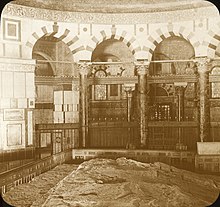Arabs react to Israeli debate on Jerusalem's Holy sites
Thursday, February 27, 2014

Image: OSU Special Collections & Archives.
Islamic and Jordanian leaders responded yesterday to a debate conducted by the Israeli parliament, the Knesset, addressing current Arab control over holy sites in the Old City of Jerusalem including Al-Aqsa Mosque and the Dome of the Rock.
Last week, members of the Jordanian Parliament condemned the plan for a debate in the Knesset on the issue, but yesterday after the debate in Israel almost 50 of them had petitioned the Jordanian government to stop the enforcement of the 1994 Israel–Jordan peace treaty. The treaty allowed for the exchange of ambassadors and on that point, the Jordanian parliament voted on the recall of the nation's ambassador to Israel. Jordan's Prime Minister Abdullah Nsur said, in remarks to Qatari newspaper Al-Watan, any Israeli action affecting Jordanian control of the Holy sites would violate the treaty and Jordan could review whether or not the treaty had been invalidated. Meanwhile, the Organisation of Islamic Cooperation criticized the Knesset debate as a provocation.
Before the Israeli debate Tuesday, Palestinian protesters took to one of the Gates of the Temple Mount in the Old City, used by Jews, armed with firecrackers and rocks and were met by Israeli police.
On Tuesday, members of the Israeli Knesset began a debate on an issue it had never before broached. MK Moshe Feiglin of Likud started the debate about one of Jerusalem's holiest sites, The Temple Mount. Feiglin spoke to freedom of religion and the right of Israelis to pray on the site controlled by the Arabs while opponents addressed their fears the sensitive topic could harm ongoing peace talks. He said, "Any terror organization can raise its flag there, [but] there can be no trace of the Israeli flag. Only Jews are forbidden to pray at this place."
During the debate, Labor MK Eitan Cabel reacted to Feiglin's motion, "Why stop at the Temple Mount? If you are the new messiah of our times, what about" — he named various specifics of the holy promise of the lands of the Greater Israel — "Why leave them behind?" A "Greater Israel" promised by God is generally considered off limits in civic discourse inside Israel. The Knesset did not vote on the issue.
Al-Aqsa Mosque ranks just behind Mecca and Medina as the holiest of Islamic sites. Jews consider the Temple Mount to be their holiest site.

The outdoor Islamic Pulpit of the Cadi Borhan-ed-din Jerusalem Holy Land at the Al-Aqsa Mosque, Jerusalem.
Image: Snapshots of The Past.

The Dome of the Chain (Arabic: قبة السلسلة, Qubbat al-Silsila) in front of The Dome of the Rock.
Image: Godot13.
Sister links
Sources
- "Jordan PM warns peace deal with Israel may be reviewed" — The Daily Star (Lebanon), February 26, 2014
- Mohammad Tayseer, Donna Abu-Nasr. "Jordan Lawmakers Seek to Expel Israeli Ambassador Over Holy Site" — Bloomberg News, February 26, 2014
- "Muslim body slams debate on Jewish prayer at Al-Aqsa mosque" — Raidió Teilifís Éireann, February 26, 2014
- "Jordan MPs urge scrapping peace treaty with Israel" — Press TV, February 26, 2014
- Gil Ronen. "MK Cabel Asks Feiglin: Are You the Messiah?" — Arutz Sheva, February 26, 2014
- Adiv Sterman, Gavriel Fiske. "Debate on Temple Mount worship rocks Knesset" — The Times of Israel, February 25, 2014











